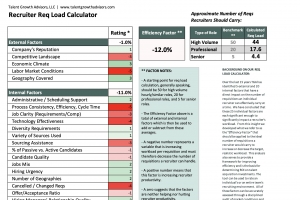Recruitment Tips for New Talent Acquisition Leaders

As organizations morph, downsize, reorganize and evolve their HR teams, incumbents often are faced with new and surprising career opportunities. If you're one of those HR generalists who has been presented with the opportunity to work in talent acquisition, there are a host of things to consider and a number of things to do as you take the leap.
1 - HR generalists, don't believe the hype about recruiting being easy.
It's not. In fact, it's arguably harder than any other aspect of a HR generalist role. Consider the following blend: a high volume of work, critical skills in short supply, the fact that everyone is a stakeholder, compliance requirements, technology components, measurement demands, vendor involvement, amount of budget and skills of recruiters . . . it's a beast.
2 - Learn the ins and outs of the staffing process.
Take the time to review the way recruiting is supposed to work in your organization. Get informed, learn the technology, and become familiar with the tools. As you move from a HR generalist role to talent acquisition, be prepared to answer questions from hiring managers, candidates, internal employees and senior leaders.
3 - Get to know your client group.
Schedule time with your senior leaders and key hiring managers. Ask them questions about their experience in the past with the recruiting team - what they'd like to start, stop and continue. Find out about their business plans, key challenges and most important talent needs. Ask how you can get to know the team and become consistently involved in talent-related discussions.
4 - Learn more about sourcing, interviewing and influencing.
These are key skills for anyone in a recruiting role. They require practice, coaching and on-going learning. Leverage your peers, your boss, recruiters in other companies, networking events, recruiting-specific sites, blogs, videos and courses, development tools, and SkillBuilder for talent acquisition.
5 - Be prepared to love people less.
Are you a real people person? Do you love helping others? In order to succeed in recruiting, you'll need to focus more on the needs of the business, rather than the needs of the individuals you'll encounter daily. Your time will be spent sourcing talent, managing reqs and candidates in the technology, updating and negotiating with hiring managers and HR generalists, and juggling a never-ending amount of work and competing priorities. If you think you'll be able to kick back and chat throughout each day with hiring managers and candidates, think again.
6 - Regularly ask for feedback.
Ask your clients, your candidates, your peers - anyone who counts on you for recruiting support. And keep close tabs on your key metrics - specifically, efficiency (how many reqs are you filling and how often?) and effectiveness (how well do your new hires fare in the organization?) Adding value means constantly understanding how you're doing - and what you can do better. So don't be shy, ask for feedback often. Shore up your skillset by finding a coach or developing yourself.
Excellent recruiters are a rare breed. They often possess a unique blend of process orientation and savvy selling skills. But these traits can be learned by a HR generalist. And the very best recruiters add immeasurable value to their organizations and quickly become invaluable to their hiring managers. Ready to make the leap after reading this? Let us know what you think!
Contact us; we'd love to meet you! You might also want to read How Many Reqs Should a Recruiter Carry? Finally...A Recruiter Workload Calculator and check out our New Recruiting Leader Coaching.
Share this Article
Learn more about our unique approach to Talent Strategy Formulation.



